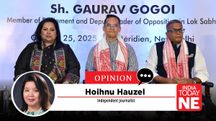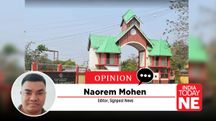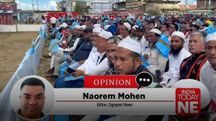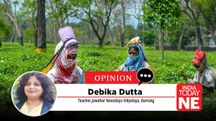They Fought Kuki Lies Together — Why Fight Each Other Now?
A bitter irony unfolds in Manipur now. Two Meitei leaders who once stood shoulder-to-shoulder against a common narrative of falsehood now trade blows in public. Former Chief Minister N. Biren Singh and Lok Sabha MP Angomcha Bimol Akoijam—once united in defense of their people—have turned social media into a battlefield.
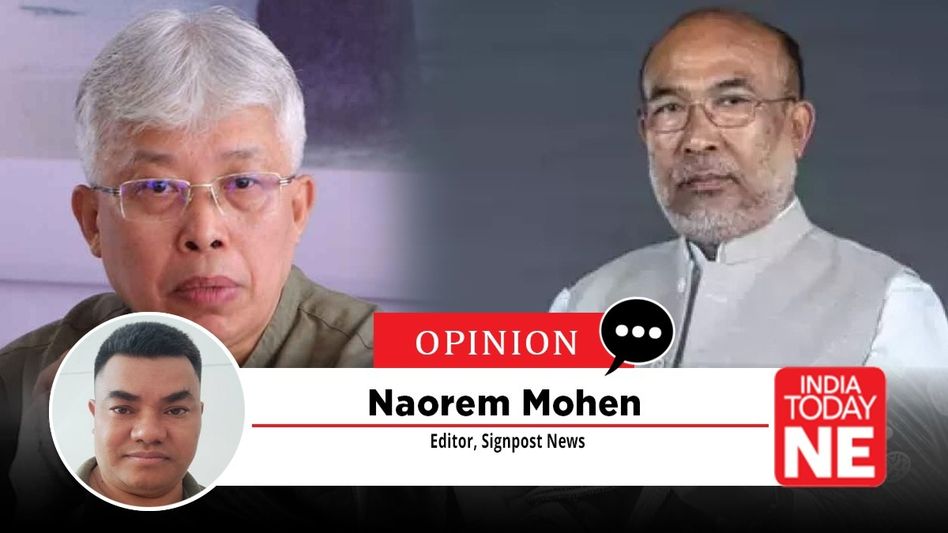
A bitter irony unfolds in Manipur now. Two Meitei leaders who once stood shoulder-to-shoulder against a common narrative of falsehood now trade blows in public. Former Chief Minister N. Biren Singh and Lok Sabha MP Angomcha Bimol Akoijam—once united in defense of their people—have turned social media into a battlefield.
What began as pointed critiques has escalated into a full-throated war of words, broadcast live for a state already reeling for 909 days of unrelenting conflict. This is not mere political theater; it is a betrayal of trust in a land governed under President’s Rule, where the central authority’s grip highlights the collapse of local leadership.
The question is no longer who is right or wrong. It is simpler, and far more painful: They fought Kuki lies together—why fight each other now?
Rewind to May 2023. When violence erupted, Biren, as Chief Minister, positioned himself as the unyielding defender of the valley, believing the attack on Manipur soil as an existential threat to survival of native people of the state. From Imphal, he issued directives, rallied security forces, and spoke of “infiltration” and "narco terrorism.”
However, as clashes intensified, he was made the scapegoat, just a State Home Minister for the namesake. Instead, a security advisor was appointed by the Centre. Many targetted him as the Chairman of Unified Command. If he was the leader of such commands, why can't he make decision and interfere in the deployment of state police alongside Central forces, coordinating massive combing operations that could end the conflict within 2-3 months of the crisis?
Despite all these hindrances and accusations from the Kuki MLAs and the opposition camps, N. Biren Singh exemplified proactive leadership by personally visiting relief camps, where he engaged directly with families displaced from violence-hit areas like Tengnoupal, Churachandpur, and Kangpokpi districts. He also extended immediate relief through financial assistance. He tried at best level, coupled with fervent calls for inter-community harmony and close collaboration with central leadership to bolster compensation packages and foster peace-building efforts.
Meanwhile, in the newsroom in Delhi, Bimol—armed with data, history, and eloquence—tore apart the national media’s one-sided portrayal. His intellectual arsenal shone brightest in a now-legendary June 2023 interview with veteran journalist Karan Thapar, a debate hailed as one of the most incisive defenses of Manipur's truth amid the fog of propaganda.
Facing Karan Thapar's probing questions on the violence's roots, Bimol dismantled the dominant narrative that scapegoated Meiteis as aggressors, tracing the conflict to colonial-era "divide-and-rule" policies perpetuated by post-independence India. He lambasted the selective outrage, pointing out how media outlets amplified Kuki grievances while ignoring Meitei anxieties over demographic shifts and land encroachments—issues Biren had spotlighted on the ground.
It wasn't just Karan Thapar; Bimol squared off against Kuki intellectuals and panelists on national TV, from prime-time shows, where he methodically debunked claims of Meitei "supremacy" by citing historical treaties, migration data, and the economic stranglehold of Kuki militias on border trade.
One standout exchange saw him challenge a prominent Kuki academic's assertion of "tribal victimhood" by highlighting unreported arms flows from Myanmar, forcing the panel to concede the complexity beyond binary blame. These weren't scripted soliloquies; they were surgical strikes in the information war, amplifying Biren's on-site defenses to a national audience and shielding Manipur from being branded a Meitei monolith.
Together, though never formally allied, they formed a two-front defense: one on the ground, the other in the national discourse. The people saw it. They remembered it. They believed in it.Yet today, that memory feels like a cruel joke. Bimol accuses Biren's statement relating to the MP as "very childish". Often branding Biren’s tenure a “catastrophic failure,” implying complicity in the very chaos he once claimed to prevent.
Their feud is not born of ideology—both champion Meitei aspirations for integrity and cultural preservation—but from a toxic blend of ego, blame-shifting, and political positioning. By February 2025, amid leaked audio tapes, Kuki groups filed pleas branding him the "main perpetrator," while even allies like the National People's Party withdrew support in November 2024, citing his failure to restore normalcy. The dominoes fell: internal BJP dissent from valley MLAs, a looming no-confidence motion from Congress, and mounting public fury after the Jiribam abductions.
N Biren resigned on February 9, 2025, not as a villain fleeing accountability, but as a sacrificial lamb—pressured by the Centre to avert a floor test collapse, saving the BJP's fragile majority and, in the eyes of his supporters, the state's fragile unity. He lost his chair to save Manipur, they say; his "strongman" tactics, once lauded for repelling Kuki advances, became the scapegoat for prolonged unrest.
Bimol's critiques, sharp as they were in the newsroom, and as MP in the Parliament - ignore this martyrdom, painting Biren as the arsonist rather than the firefighter who got burned.
Observers, from Imphal’s tense streets to the fetid relief camps in the valley, see through the charade. As one displaced elder in Akampat Relief Camp expressed, “We don’t need their explanations. We need to go back.” The people have already judged. No further rebuttal is required.
Bimol's TV triumphs, which once echoed Biren's warnings about "foreign hands" and media bias, now ring hollow when turned inward.At the heart of this fracture lies a profound failure of identity—and geography. Manipur’s map is no longer whole. “Imaginary buffer zones” now divide the state—Sekmai for valley dwellers, Pallel for those heading south.
Beyond these checkpoints lies fear: ambushes, kidnapping, blockades, and the constant threat of reprisal. For Meiteis, the inability to travel freely along National Highway 2 is not just logistical—it is existential. These roads were once arteries of life, carrying crores worth of businesses from Moreh, and dreams from Imphal to the world.
While Biren and Bimol hurl accusations in English and Meiteilon, the highways remain closed, businesses in Moreh lie dormant, and 70,000 displaced souls wait in limbo.
Social media, once a tool to counter Kuki propaganda, has become their coliseum. Biren’s speech, post resignation drip with patriotic fervor. Bimol’s rebuttals are sharp, scholarly, and relentless, drawing from his Thapar showdown to question Biren's legacy.
Their followers cheer. But in the relief camps of Imphal and Kangpokpi, where families share foods to survive each day, these battles are invisible—and irrelevant. The “like” button does not feed a child. A retweet does not reopen a highway.
Under President’s Rule—imposed in February 2025 after Biren’s resignation—the stakes are survival, not spectacle. The Union government watches. The security forces wait. And the people grow weary, haunted by Biren's sacrifices and Bimol's eloquence, now weaponized against kin.
The clarion call is not for unity in the abstract—it is for Meitei identity to triumph over politics. Imagine this: a Meitei Leipung Phamba, not in Delhi’s air-conditioned lobbies, but in Imphal’s open ground, may be Kangla. Nongthombam Biren, Angomcha Bimol, Thongam Biswajit, Thokchom Satyabrata, konthoujam Govindas, Yumnam Joykumar, Okram Joy, Okram Ibobi, Kangujam Ranjit, Keisham Meghachandra—convening not to assign blame, but to deliver results.
Their agenda? Reopen both highways with joint security patrols, safe return of IDPs to their homes. This is not utopianism. It is pragmatism.
The people of Manipur do not see Biren and Bimol as BJP or Congress. They see them as Meitei—two leaders who once fought the same enemy with different weapons. They do not want debates. They want a normalized state: IDPs returning home, trucks rolling into Moreh. They want the highways alive again—traders haggling, porters loading, life resuming.
Let Biren lead on the ground. And let Bimol fight in Delhi. But let them fight together, as they once did—Biren holding the line against Kuki militants, Bimol shattering media myths.
Only when normalcy returns should the campaign for 2027 begin. Let the people decide then who led better. But for now—for Manipur’s sake—stop the jabs. Silence the keyboards. Reclaim the roads. Remember: You fought Kuki lies together. Now fight for Manipur—together. Let them tour the camps together, not as rivals, but as the duo that once defied the storm.
Biren and Bimol, titans in their own right, hold the power to turn the tide. Will they? The people watch, not with anger, but with fading hope. In a state where every dawn carries the whisper of fresh violence, unity is not optional—it is oxygen. Let this war of words be the last gasp of division, replaced by the steady heartbeat of solidarity. For Manipur’s sake, and our shared future, it must be so.
Copyright©2025 Living Media India Limited. For reprint rights: Syndications Today

